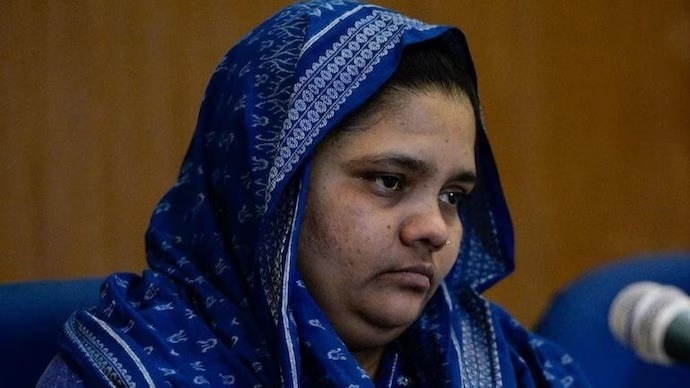The Supreme Court on Thursday posed a volley of questions to the Gujarat government and the Centre over the “selective” application of a remission policy for the convicts serving jail terms for gang-raping Bilkis Bano and murdering her family members during the 2002 post-Godhra riots in Gujarat.
The apex court is hearing a series of petitions on the untimely release of the men convicted for raping Bilkis Bano and slaughtering her family during the 2002 riots.
The judges said the Gujarat government is on “thin ice” as far as the grant of premature remission release is concerned.
Also Read: Bilkis Bano case: Supreme Court defers till July 11 hearing on pleas against remission to convicts
“The convicts’ death penalty was commuted to life imprisonment. How could they be released after serving 14 years in such a situation? Why are other prisoners not given the relief of release? Why were these culprits selectively given the benefit of the policy in this case?” asked the bench of Justices BV Nagarathna and Ujjal Bhuyan.
Another question posed by the SC was that “How far this rule — giving a chance to hardened criminals to reform — by releasing them after 14 years is being applied to other prisoners? Why is the policy being applied selectively? Opportunity to reform and reintegrate should be given to all. How far is this being implemented? Why are our prisons overflowing? Give us data.”
The court also questioned on what basis the Jail Advisory Committee was formed for Bilkis convicts, ordering the state to provide details. It also asked why the opinion of the Godhra court was sought since the trial was not conducted there.
The 11 men released on Independence Day last year were sentenced by a court in Maharashtra. The judge who found them guilty had also given a negative response to the state’s question on whether the convicts should be released.
On behalf of the Gujarat government, Additional Solicitor General SV Raju said it is difficult to answer the court’s queries in general. He, however, told the court that a case is pending in the Supreme Court, in which all the states have to give detailed information.
The convicts, he said, have been released according to the law. Since they were convicted in 2008, they had to be considered under the 1992 policy.
In the last hearing, the bench had questioned an earlier order of the Supreme Court in the Bilkis Bano case. The court asked how the previous order was passed on a PIL (Public Interest Litigation) and it should have been an appeal against the order of the Bombay High Court.
Bilkis Bano’s lawyer Shobha Gupta said the Gujarat government’s decision on the release of the convicts is wrong.
“The Maharashtra state was not heard in this matter. The Center has not even been made a party in this… the Supreme Court’s order was only in relation to the application of convict Radheshyam, while the Gujarat government gave exemption to all 11 convicts,” she said.
Convict Radheysham Shah had moved the Supreme Court seeking remission on the ground that he had completed 15 years and 4 months in jail. The court had asked the Gujarat government to look into the matter and decide within two months whether he could be granted remission.
In response, the Gujarat government had released all the convicts.

